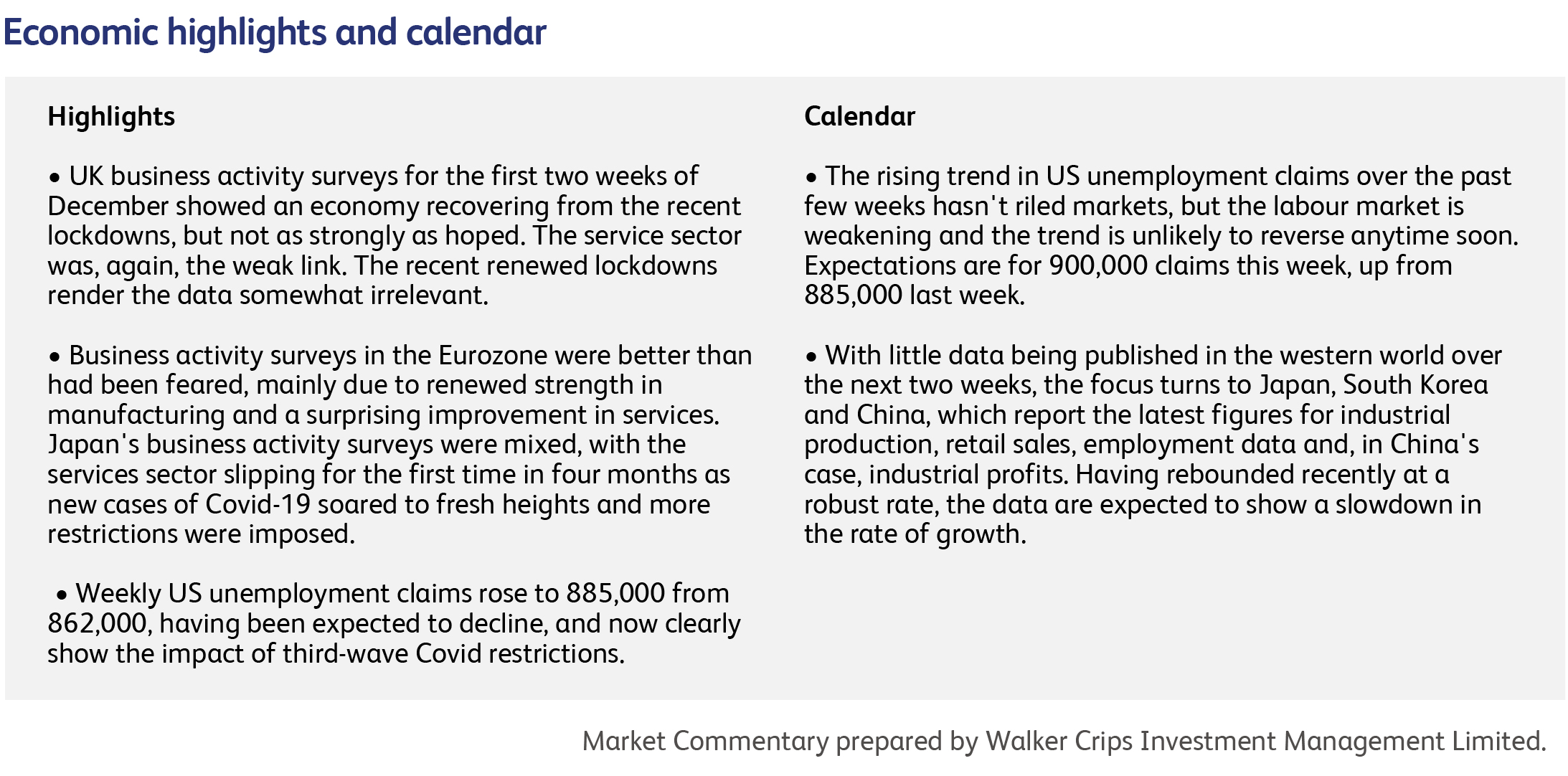
22 December 2020
After nearly six months of wrangling, the second US coronavirus relief bill was passed, unleashing $900 billion of government spending. The original relief bill, passed in March, was worth about $2 trillion to the economy, and was generous enough that most people whose jobs were affected by the pandemic actually saw their incomes increase. This new package, which will add about 2.5 percentage points to 2021 economic growth, includes a $600 cheque (compared with $1,200 last time) for most US citizens and an extra $300 a week in unemployment benefits (compared with $600 last time).
Most households do not actually need the $600 one-time payment - unemployed people will spend a much higher proportion of their payments but they are a small minority of the population - so much of it is likely to add to the $2 trillion in savings accumulated since the pandemic started. Opinions differ on how much of those savings have ended up in the stockmarket, but retail investor activity in the US now exceeds internet-boom levels. This time around, however, the craze has favoured traders using options.
Notably, the fractious political environment in the US prevented money going to state and local governments, whose revenues have dropped sharply at the same time that the pandemic has forced them to increase spending on public health measures. State and local government employment plunged by nearly 1.5 million between February and May and only about a tenth of those jobs have returned, compared with 60% of jobs in the private sector.
In contrast to the European Central Bank’s downbeat comments and preventive actions last week, the US Federal Reserve Bank emphasised the positives and did nothing. The Fed made no mention of the deterioration in real-time economic data over the past couple of months, and Chairman Powell said he was surprised that the third Covid wave had caused less damage than he had expected. The Fed’s economic forecasts for the US economy were revised up slightly for this year, and the next two. That said, the forecasts assume that base rates won’t rise for the next three years, and no mention was made of the impact of vaccinations.
The Bank of England’s Monetary Policy Committee voted unanimously to keep rates and the quantities of asset purchases unchanged, but it did give its clearest indication yet that it would ease monetary policy further in the event of a No-Deal Brexit: “compared with previous periods during which non-negotiated Brexit outcomes had been possible, the economy was starting from a weaker position…”. It did not, however, mention how it would ease and, in particular, the decision on negative rates is still likely to be announced in February. The Committee noted that the positive news on vaccines merely reinforced its existing forecast for economic growth next year, which already took Covid-19’s fading impact into account.

It has been a spectacular year for Initial Public Offerings of stocks in the US, but it may have ended with a whimper after internet company ContextLogic (owner of the “Wish.com” shopping website) fell 16% from its IPO price. According to Bloomberg data, that’s the worst start this year, and the second-worst start in 20 years, for an IPO worth at least $1 billion. Of all IPOs this year, 167 rose on their first day, and those stocks are now, on average, trading 85% above their offering prices. Of the 65 IPOs that fell on their first trading day, their share prices are, on average, 8.1% above their IPO prices.
Tesla’s imminent entry into the US stockmarket S&P 500 Index prompted unheard-of trading volumes, with $148 billion worth of shares traded on Friday. This beat the previous record of $118 billion for a fund tracking the entire S&P 500 index in March. By comparison, the value of Microsoft shares traded each day averages about $5 billion. Tesla shares ended the day roughly flat, having see-sawed during the day by as much as 4% up and down from the opening price. On their first actual day in the Index, Tesla shares were down 6.5%.
While Bitcoin was enjoying a 120% rally from its September level that took it above $20,000 for the first time, a small digital-currency fund in the US saw its share price soar 369% higher than the net asset value of its underlying Bitcoin and Ether holdings. The premium means that investors in the fund are paying up for access to the fund, instead of buying its underlying holdings far more cheaply.

This publication is intended to be Walker Crips Investment Management’s own commentary on markets. It is not investment research and should not be construed as an offer or solicitation to buy, sell or trade in any of the investments, sectors or asset classes mentioned. The value of any investment and the income arising from it is not guaranteed and can fall as well as rise, so that you may not get back the amount you originally invested. Past performance is not a reliable indicator of future results. Movements in exchange rates can have an adverse effect on the value, price or income of any non-sterling denominated investment. Nothing in this document constitutes advice to undertake a transaction, and if you require professional advice you should contact your financial adviser or your usual contact at Walker Crips. Walker Crips Investment Management Limited is authorised and regulated by the Financial Conduct Authority and is a member of the London Stock Exchange. Registered office: Old Change House, 128 Queen Victoria Street, London, EC4V 4BJ. Registered in England number 4774117.
Important Note
No news or research content is a recommendation to deal. It is important to remember that the value of investments and the income from them can go down as well as up, so you could get back less than you invest. If you have any doubts about the suitability of any investment for your circumstances, you should contact your financial advisor.